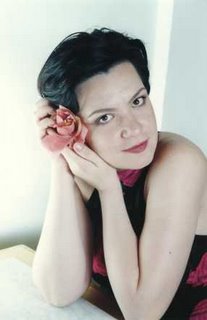
Ekaterina Semenchuk, mezzo-soprano |
This is a week for summer opera, and there is not a single chestnut on the schedule, at least not yet. For the penultimate concerts of his tenure at the National Symphony Orchestra, Leonard Slatkin programmed another opera. Much of Tchaikovsky's showy instrumental music leaves me cold, but in his songs and operas the composer's melodic gifts and dramatic sense are in the right place. His masterpiece, Eugene Onegin, is an almost perfect work, in which no gesture is superfluous: every stroke is calculated to advance the story, a tale not of operatic clichés, but of gut-wrenching regrets. Like so much Russian art, the libretto draws on Pushkin, a novel in verse (in English translation) that Vladimir Nabokov said could not really be translated into English (see his poem On Translating Eugene Onegin).
The opera is hardly a rarity, having been mounted by Virginia Opera earlier this year, quite memorably last season at the Met, and by the Kirov Opera in 2003. In fact, Leonard Slatkin programmed scenes from the opera for the NSO Season Opening Ball Concert in 2006, with two of the same singers under his baton this week. As heard on Saturday night, the best part of the mostly Russian cast, largely from Valery Gergiev's stable, was the mezzo-soprano Ekaterina Semenchuk as Olga. Much as she did in the Kirov Opera performance of Verdi's Requiem in 2006, Semenchuk soared but especially plunged into a molten bottom range, wallowing in the earthy depths of Tatiana's playful sister.

Irina Mataeva, soprano |
At her side was the lovely soprano Irina Mataeva, who was also a gorgeous Desdemona in the Kirov Opera's Otello last year. Hers was not the most vocally crystalline or powerful Tatiana, and some of the top part of the tessitura was a little strained, but there was a similar girlish fragility here, as with her Desdemona, that was utterly convincing. The male leads were good, if not quite as good. We had good memories of tenor Daniil Shtoda in Il Viaggio a Reims (DVD and at the Kennedy Center), but his timbre was disappointingly dull at first. By the duel scene, however, his voice had warmed considerably, and he gave an exquisitely sensitive and moving rendition of Lensky's final aria. Veteran baritone Sergei Leiferkus was a patrician Onegin, weary of the world vocally and dramatically, unraveling his tightly wound control only in his despair at the end of the opera.
Most impressive among the supporting cast was a smart, graceful cameo by local tenor Robert Baker as the poetry-spouting Frenchman Triquet. Bass Gustav Andreassen attacked the role of Gremin with incisive snarl, perhaps too much for the nature of the role. Mezzo-sopranos Irina Tchistjakova and Mzia Nioradze were appropriately maternal as Larina and Filipyevna, respectively. The Washington Chorus, bolstered by at least a couple professional ringers, was a frenzied presence in the chorister seats above, shouting folk songs and comments. Tenor Gerald Kavinski (a longtime friend of Ionarts) had a fine little moment, uncredited, as the leader of the peasants in Act I, returning from their backbreaking work in the fields.
While the Russian cast knew the opera very well, the NSO had a lot to prepare for these concerts, and the results, while pleasing, left some polish and unity to be desired. Slatkin opted for a nearly complete performance of the score, including almost all of the worthy dance music, much of it among the most famous sections of the opera, cutting only the écossaise in Act III. Slatkin has a tendency to shave off a little wedge of the start of his beat sometimes, which can create havoc as he pushes the tempo forward (as in the accelerando of the introduction to the Letter Scene, which was otherwise very satisfying). The horn and oboe solos, the latter by soon-to depart Acting Principal Rebecca Henderson, were particularly well performed.
This concert will be repeated once more, this evening at 8 pm. The farewell concerts for Leonard Slatkin, which we will unfortunately miss, are scheduled for June 26 to 28, with Sol Gabetta playing the second Shostakovich cello concerto (much better than the Tchaikovsky Rococo Variations originally announced), as well as a welcome performance of Copland's third symphony. It is not a program of old favorites, for which Slatkin is to be commended: a meaty departure.























































No comments:
Post a Comment